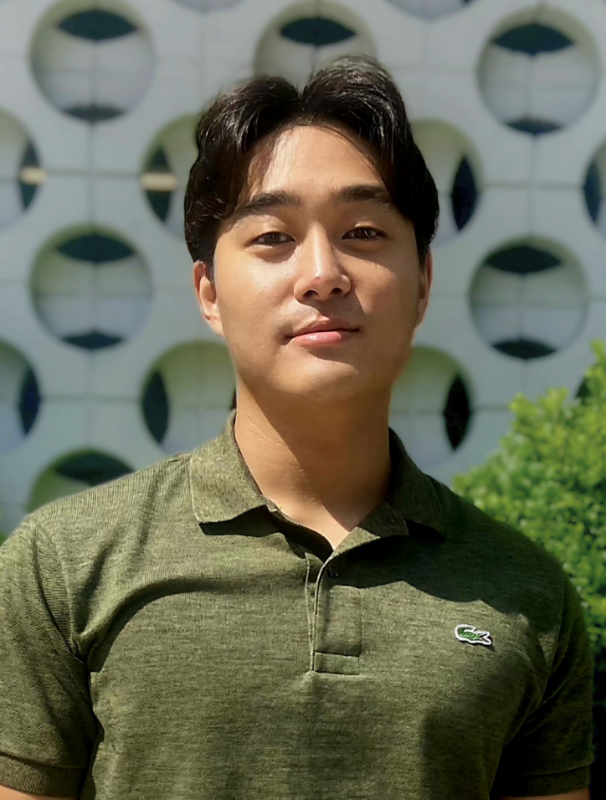
Earning my Ph.D. will equip me with more skill sets and the knowledge that I’ll need in industry.
Mechanical engineering graduate student Jangho Yang has spent countless hours thinking about phase change materials (PCMs) – substances that release or absorb thermal energy when they change phases, like from solid to liquid – and in the process, he’s had his own change of heart. Yang enrolled at the University of Maryland (UMD) in 2019 determined to earn a master’s degree in two years and then head into the workforce. But in spring 2021, with his master’s degree within reach, the Center for Environmental Energy Engineering (CEEE) graduate research assistant opted to stay at UMD to pursue a Ph.D.; he now expects to complete and defend his dissertation in early 2026.
“One day I just had a realization that I like what I do; I love the people here; and I'm still learning every day,” Yang recalls. “Earning my Ph.D. will equip me with more skill sets and the knowledge that I’ll need in industry. I realized that the opportunity was right here. All of a sudden, I became very grateful for that opportunity – after all, students from around the world are eager to come to CEEE.”
While Yang was born in the United States, his family’s roots are in South Korea, and they moved back there when he was only two. Later, he returned to the U.S. for high school and college. After earning his B.S. in mechanical engineering from the University of Texas at Dallas in 2015, Yang traveled back to South Korea to fulfill the two years of military service required to keep his South Korean citizenship.
Yang’s time in the military gave him an opportunity to hone his leadership skills – he served as a squad leader – and to reflect on a career path. One of his favorite college courses was an elective on heating, ventilation and air conditioning (HVAC) technologies; so, he decided to pursue an advanced degree specializing in the topic. “I like that it’s an area that impacts our daily lives and that I could make a real impact with my work,” Yang says. When he was looking for graduate programs, CEEE was a natural fit because of its reputation as an international leader in the innovation of HVAC technologies.
As a graduate research assistant with CEEE’s Energy Efficiency and Heat Pump consortium, much of Yang’s research has focused on PCMs. He helps develop, fabricate and test PCM-embedded heat exchangers designed to be integrated into HVAC systems to reduce energy demand and shift peak load. He works under the guidance of Research Professor and EEHP Director Yunho Hwang.
Yang was also instrumental in developing CEEE’s database of over 530 commercially available PCMs. The filterable database includes information about each PCM’s thermophysical properties and has quickly become an important tool to help HVAC engineers identify potential PCMs best matched for the technologies they are developing. PCMs are gaining importance as a promising storage medium for thermal energy storage systems.
For his dissertation, Yang is tackling one of the biggest challenges in the HVAC sector – the need to improve the performance of cold climate heat pumps to facilitate their widespread adoption. Electric heat pumps offer an eco-friendly alternative to fossil-fuel burning technologies, but their performance can be compromised in cold climates by a variety of factors. “One of the issues is that frost accumulation acts as thermal insulation and obstructs airflow, resulting in reduced heating capacity and decreased performance,” explains Yang, who is proposing a technology that would speed up the defrosting process, while lowering energy consumption. The proposed air source heat pump would improve performance by leveraging an injection compressor and a thermal energy storage system using PCM.
With graduation nearing, Yang is amazed by how much he has learned and how much there’s still to learn. “The more you know, the more you realize what you don’t know,” he says, pointing out how former CEEE Director Reinhard Radermacher was a renowned expert in thermal energy systems but would frequently answer technical questions with, “I don’t know; let me think about it.”
After graduating, Yang plans to work in industry, ideally in the Washington, D.C. or Baltimore area. In the meantime, he is savoring his time at UMD, where he plays intramural soccer and works out at the campus gym – oftentimes with other CEEE students. “I enjoy the daily banter with my colleagues. We have great chemistry, and everyone is very humble – even though they know so much,” Yang says. “One of my favorite things about CEEE is just being with the people here. It’s a big factor of why I decided to stay on and earn a Ph.D.”
Top